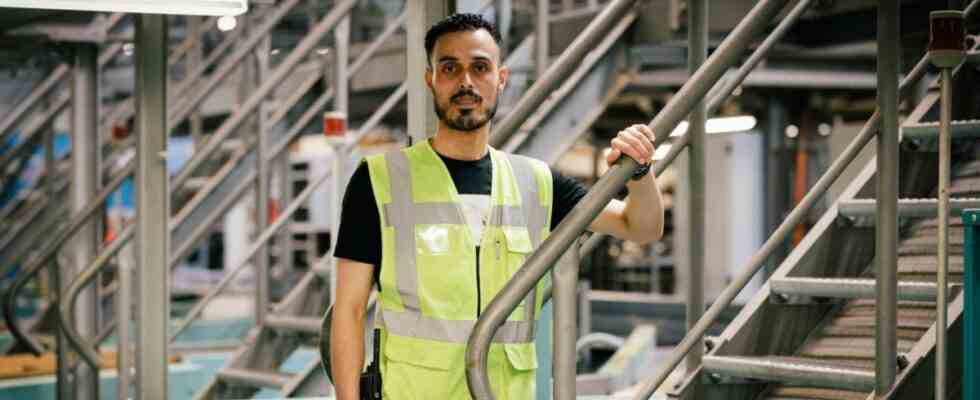A labyrinth of conveyor belts rattles by over Mohammad Al Kadri’s head, and the roar of the machines almost drowns out his voice. Putting the parcels and parcels from the trolleys onto the belts was the first job he took on, he says. The packages are delivered by truck to large open gates to be transported and sorted further in the hall. Al Kadri has been working in the Deutsche Post parcel center in Aschheim for seven years. The native Syrian started here shortly after he fled. The 32-year-old is now responsible for several employees and wants to make it to shift manager in the company next. A success-story.
Which it didn’t necessarily look like at first. In 2014, like so many others, he first came to Italy from Libya via the Mediterranean. The crossing was dramatic: almost 300 people had crowded into a boat that was actually only made for about 100. “There were too many, it was very dangerous.” Al Kadri is always looking for words to describe his experiences. His gaze is directed into the distance, as if he were seeing the images from back then again in his mind’s eye.
According to the United Nations, more than 100 million people are currently fleeing the world – more than at any time since the Second World War. Last but not least, the war in Ukraine contributes to the negative record. In view of these dramatic current developments, the events of the refugee crisis in 2015, when more than a million people came to Europe, mainly from Syria, seem to have been almost forgotten in many minds.
It all started for Mohammed Al Kadri in Aschheim by loading the packages onto the assembly line himself.
(Photo: Sebastian Gabriel)
Not so with Mohammad Al Kadri, who fled his native Syria in 2014. When the 32-year-old tells his story today, you can tell that his experiences still shape him – even though he now feels integrated in Germany and can look forward to promotion at his employer, the parcel center in Aschheim.
The trip across the Mediterranean lasted a day, but after all the hardships, Al Kadri was received anything but warmly in Italy, he says. “I almost got hit by the police there, I don’t know why.” He finally took the train to Germany, where he received a much friendlier welcome at Munich Central Station: “Everyone was very nice and helped me.” Asked about his family, Al Kadri goes quiet. She also fled, but he cannot say where she lives today. The contact was completely broken off on the run.
When he got a job in the Aschheim parcel center from the employment agency almost seven years ago, Al Kadri quickly made friends: an employee took him under his wing, “he was like a father”. A few months in which he only worked on a trial basis eventually turned into a permanent position.
The work helped him to learn German
The early days were difficult because Al Kadri spoke no German. “I learned that in Germany, first I did a course and then continued learning myself.” Understanding his German colleagues and making himself understood in the foreign language was the biggest challenge at the time. However, the work helped him to make faster progress.
Because of his lack of German, the 32-year-old was initially not very confident about making a career in the parcel center: “I thought I’d just always be an employee.” But he was wrong: Al Kadri first rose to become group leader, two years ago he became supervisor of the other employees. The men who place the packages on the conveyor belts now report to him. Their relationship is still collegial, as you can see on a tour of the hall. Al Kadri jokes with them, they laugh as he poses for photos in front of the packages.
According to Al Kadri, 300 to 350 people work in the huge hall every day, divided into day and night shifts. Al Kadri himself has to supervise them, distribute the staff to the different stations and pay attention to the breaks. He also fixes faults to ensure that things run smoothly.
Today, the native Syrian keeps an eye on the work of his colleagues in the large parcel hall.
(Photo: Sebastian Gabriel)
The former refugee bears no small responsibility: the Aschheim parcel center is one of the largest in Germany with one of the highest throughputs of parcels. Around 400,000 parcels are processed here within 24 hours, and there are even more at peak times such as before Christmas. In his own words, Al Kadri is proud to be able to help so many people receive their packages. He is now convinced that he can continue to climb the ladder in Aschheim: his goal is to become a shift supervisor one day.

